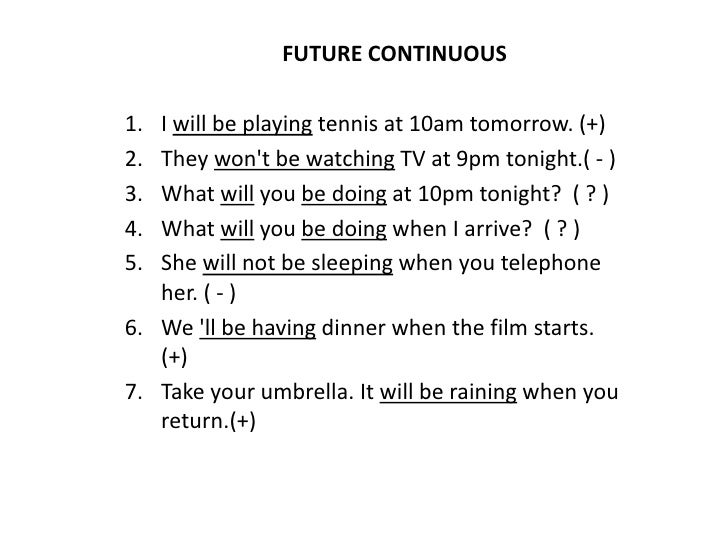Idioma Future Perfect (Futuro perfecto) & Future Perfect continuous
-
AutoBanned

 Future Perfect (Futuro perfecto) & Future Perfect continuous
Future Perfect (Futuro perfecto) & Future Perfect continuous
Future Perfect (Futuro perfecto)
[will have + past participle]

Como hemos visto en las lecciones anteriores, hay dos maneras principales para expresar el futuro. A diferencia del futuro simple, en el tiempo perfecto, el uso de ellas es en general intercambiable.
Grammatical Rules (Reglas gramaticales)
Structure (Estructura)
Affirmative Sentences (Frases afirmativas)
Estructura 1 Sujeto + "will have" + verbo principal...
Estructura 2 Sujeto + verbos auxiliar ("to be") + "going to have" + verbo principal...
Ejemplos:
The party will [is going to] have ended by the time you finish work. (La fiesta habrá terminado cuando termine el trabajo.)
I'll [I'm going to] have eaten before we meet. (Habré comido antes de reunirnos.)
Negative Sentences (Frases negativas)
Estructura Sujeto + "will" + "not" + "have" + verbo principal...
Estructura Sujeto + verbo auxiliar ("to be") + "not" + "going to have" + verbo principal...
Ejemplos:
The party won't [isn't going to] have ended by the time you finish work. (La fiesta no habrá terminado cuando termine el trabajo.)
I won't [I'm not going to] have eaten before we meet. (No habré comido antes de reunirnos.)
Interrogative Sentences (Frases interrogativas)
Estructura "Will" + sujeto + "have" + verbo principal...?
Estructura Verbo auxiliar ("to be") + sujeto + "going to have" + verbo principal...?
Ejemplos:
Will [Is] the party [going to] have ended before you finish work? (¿La fiesta habrá terminado antes de que termine el trabajo?)
Will [Are] you [going to] have eaten before we meet? (¿Habrás comido antes de reunirnos?)
Uses (Usos)
Se usa el futuro perfecto para acciones que ya se han terminado antes de otra acción en el futuro. También, se puede usar para expresar que algo va a suceder antes de un momento específico en el futuro.
Ejemplos:
I'll have finished my studies before I start my new job. (Habré terminado mis estudios antes de comenzar mi nuevo trabajo.)
We won't have become fluent in Spanish by the time we leave for Mexico next month. (No vamos a tener fluidez en español antes de irnos a México el mes que viene.)
Utilizamos el futuro perfecto para mostrar que algo va a continuar hasta otra acción en el futuro.
Ejemplos:
aren is going to have worked for 50 years by the time she retires. (Karen habrá trabajado durante 50 años cuando se jubile.)
Next week, I'll have lived in Germany for 1 year. (La semana que viene habré vivido en Alemania desde hace 1 año.)
Future Perfect continuous(Futuro perfecto continuo)
[will have been + present participle]

Future Perfect Continuous (El futuro perfecto continuo)
Grammatical Rules (Reglas gramaticales)
Structure (Estructura)
Affirmative Sentences (Frases afirmativas)
Estructura 1 Sujeto + "will have been" + verbo principal.
Estructura 2 Sujeto + verbos auxiliar ("to be") + "going to have been" + gerundio.
Ejemplos:
Francis will have been living in Italy for 4 years by the time he finishes his studies. (Francis habrá estado viviendo en Italia durante 4 años, hasta que haya terminado sus estudios.)
We're going to have been working for 24 hours by the time we finish this project. (Habremos estado trabajando durante 24 horas, hasta que hayamos terminado este proyecto.)
Negative Sentences (Frases negativas)
Estructura Sujeto + "will" + "not" + "have been" + verbo principal.
Estructura Sujeto + verbo auxiliar ("to be") + "not" + "going to have been" + gerundio.
Ejemplos:
Francis won't have been living in Italy for long when he finishes his studies. (Francis no habrá estado viviendo en Italia mucho tiempo, hasta que haya terminado sus estudios.)
We're not going to have been working too long by the time we finish this project. (No habremos estado trabajando demasiado tiempo, hasta que hayamos terminado este proyecto.)
Interrogative Sentences (Frases interrogativas)
Estructura "Will" + sujeto + "have been" + verbo principal.
Estructura Verbo auxiliar ("to be") + sujeto + "going to have been" + gerundio.
Ejemplos:
Will Francis have been living in Italy for long by the time he finishes his studies? (¿Habrá estado viviendo Francis en Italia mucho tiempo, hasta que haya terminado sus estudios?)
Are you going to have been working for a long time when you finish this project? (¿Habremos estado trabajando mucho tiempo, hasta que hayamos terminado este proyecto?)
Uses (Usos)
Utilizamos el futuro perfecto continuo para mostrar que algo va a continuar hasta otra acción o tiempo en el futuro.
Ejemplos:
Jessica will have been studying English for 5 years when she moves to England next April. (Jessica habrá estado estudiando inglés durante 5 años, hasta que se haya trasladado a Inglaterra el próximo abril.)
I'm going to have been running 20 kilometers daily for at least a month before the marathon. (Habré estado corriendo 20 kilómetros diarios durante al menos un mes antes de la maratón.)
Will you have been living together for long before you get married? (¿Habréis estado conviviendo durante mucho tiempo antes de os hayáis casado?)
El uso del futuro perfecto continuo es una manera de mostrar causa y efecto en el futuro.
Ejemplos:
Jessica's English will be perfect when she moves to England next year as she'll have been studying it for five years. (El nivel de inglés de Jessica será perfecto cuando se traslade a Inglaterra el año que viene, ya que habrá estado estudiando durante 5 años.)
I'm not worried about the marathon as I'll have been running 20 kilometers a day for several weeks before. (No me preocupa la maratón, ya que habré estado corriendo 20 km diarios durante varias semanas.)
-
ForoParalelo: Miembro

-
AutoBanned

 Permisos de publicación
Permisos de publicación
- No puedes crear nuevos temas
- No puedes responder temas
- No puedes subir archivos adjuntos
- No puedes editar tus mensajes
-
Reglas del foro
▲
▼
Atajos de Navegación Disponibles